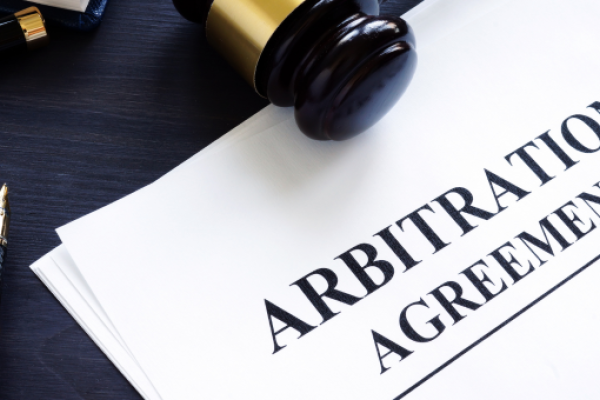
Jasmin Sandhu
Published: October 23, 2023
It is well recognised that arbitration plays a crucial role in resolving maritime disputes, offering a variety of benefits including privacy, increased flexibility and cost efficiency, and serving as an important alternative to traditional litigation. It is, therefore, important to highlight two recent decisions which touch on some interesting issues relating to arbitration.
The first case (1) concerns the arbitral appointment process and looks specifically at whether an arbitrator was validly appointed in circumstances where there was no agreement on fees or terms of engagement at the time that the arbitration notice was sent to the opponent. The second case (2) considers whether an arbitration agreement, contained in a charterparty, was binding, in circumstances where the parties were still negotiating the charterparty on ‘subjects’.
ARI V WXJ [2022] EWHC 1543 (Comm)
This case involved a dispute regarding the constitution of a tribunal in an arbitration on London Maritime Arbitrators Association (LMAA) Terms. The Claimant argued that the Defendant did not validly appoint an arbitrator by the specified date, resulting in the Claimant’s appointed arbitrator being appointed as the sole arbitrator. The Defendant requested summary judgment on the issue of whether it had validly appointed its arbitrator. The Judge concluded that the Defendant had validly appointed its arbitrator by the specified date.
The relevant charterparty was governed by English Law and included an arbitration clause referring disputes to arbitration in London under the LMAA Terms. The clause required each party to appoint an arbitrator and to send notice of such appointment, in writing, to the other party, and requiring the other party to appoint its own arbitrator within 14 calendar days failing which the appointing party could appoint its arbitrator as sole arbitrator.
On 22 December 2021, the Claimant notified the Defendant of the appointment of its arbitrator (X) and stated that if the Defendant didn't appoint its arbitrator within 14 days, the Claimant's arbitrator would be appointed as sole arbitrator.
On 3 January 2022, the Defendant emailed its proposed arbitrator (Y), to say: “we write to enquire about your availability and willingness to be appointed as an arbitrator in an LMAA arbitration in London…” . Y arbitrator responded confirming availability “for this assignment” but “subject to conflicts”, and that conflict checks were being done. The next day, Y arbitrator emailed the Defendant to say: “Good evening and it appears that I can act here without any firm conflicts”.
On 5 January 2022, the Defendant sent a notice to the Claimant, copying both arbitrators X and Y, indicating that it had appointed its arbitrator in connection with the arbitration commenced by the Claimant's arbitration notice. Subsequent correspondence between the two arbitrators revealed issues concerning the terms of their appointment and remuneration. On 1 February 2022, the Defendant’s appointed arbitrator stated that he couldn’t participate in the arbitration due to compensation concerns, resulting in the Defendant seeking a replacement arbitrator and the Claimant purportedly appointing its arbitrator as the sole arbitrator.
The Judge held that when considering whether an arbitrator had been ‘appointed’, a pragmatic and non-contractual approach was called for, partly in recognition of the fact that notice of arbitration is often served by businessmen without recourse to lawyers. Previous case law has established that an appointment requires (1) an unconditional communication of willingness by the arbitrator to act, and (2) unequivocal communication by the appointing party both to the other party and the arbitrator. It was held that, based on the correspondence between the Defendant and arbitrator Y, the Defendant had validly appointed its arbitrator by the date specified. The arbitrator had not expressly stated that the appointment was subject to a signed retainer/ agreement on fees. Further, it is often common course for arbitrators to accept appointments without agreement on fees/ signed retainers, particularly in LMAA arbitrations.This judgment provides clarity on the essential ingredients required for there to be a valid appointment. That said, parties to arbitration agreements would do well to ensure that the terms of arbitrator appointments are raised at the outset, to avoid disputes of this nature occurring in the first place.
DHL Project & Chartering Ltd v. Gemini Ocean Shipping Co Ltd (The Newcastle Express) [2023] 1 Lloyd’s Rep 245
This judgement concerned a dispute over a proposed charterparty contract that contained an arbitration agreement. The main issue was whether the arbitration agreement conferred jurisdiction on the tribunal to determine whether the charterparty has been validly and legally concluded.
The judgment discusses the principle of “separability” which in this context means that an arbitration agreement should be treated as a separate contract and should exist independently of the main contract; and further than the arbitration agreement confers jurisdiction on the tribunal to decide the validity of the main contract.
In this case, the Owners argued that a fixture recap which stated "subject shipper/receiver’s approval" included a binding arbitration agreement. Owners contended that the principle of separability applied, giving the arbitral tribunal jurisdiction to determine if the effect of the "subject" was that no binding charterparty had been concluded. The Owners also contended that the only way to challenge the tribunal's decision was through an appeal on a question of law under the Arbitration Act 1996.
An arbitrator was appointed by Owners, but the Charterers failed to respond to the arbitration notice. Accordingly, Owners appointed their arbitrator as sole arbitrator and the arbitration proceeded without participation by the Charterers. The arbitrator determined that a binding charterparty had been concluded, and the Charterers were in repudiation, awarding damages to the Owners. The Charterers challenged the award under section 67 of the Arbitration Act 1996, arguing that the arbitrator lacked jurisdiction. Additionally, they sought leave to appeal under section 69 of the Arbitration Act 1996.
At first instance, the Commercial Court agreed with the Charterers, holding that the effect of the “subject” was that no binding contract was concluded until the subject was lifted, which never happened. That applied just as much to the arbitration clause as to any other clauses in the recap. Accordingly, the arbitrator did not have substantive jurisdiction and the Charterers’ section 67 challenge succeeded (and the section 69 application did not arise). The Owners appealed, arguing that the Court had failed to give proper effect to the separability principle.
The Court of Appeal dismissed the Owners’ appeal, holding that the ‘’subject’’ in the contract was a pre-condition which had the effect of preventing a binding contract from coming into existence until the “subject” was lifted. Just as with the phase ‘’subject to contract’’, the use of the term “subject” in a charterparty recap indicated that the parties did not intend to enter contractual relations until the “subject” was resolved.
Further, the separability principle had no application in the present case. There was a distinction between cases where the argument was that no contract was concluded at all and cases where the argument was that the contract apparently agreed was void or voidable. In the former case, the argument that no contract was ever agreed necessarily affected the arbitration clause because it meant that the arbitration clause was not agreed either. In the latter case, it was necessary to consider whether the ground of invalidity in question was one which impeached the arbitration clause. It would not necessarily do so and would be presumed not to do so unless the point related directly to the arbitration agreement.
The judgment affirms that the separability principle applies when parties have reached an agreement to refer a dispute to arbitration but does not apply when the issue is whether a legally binding arbitration agreement has been reached in the first place.
Overall, the Court found in favour of the Charterers, ruling that the “subject” in the charterparty recap negated the existence of a binding contract and, consequently, a binding arbitration agreement. Accordingly, the arbitrator lacked jurisdiction.
The decision is of significance as it relates to the effect of “subjects” in the context of charterparty negotiations, and its interplay with the separability of arbitration clauses.


